Interview: Nina Dunn Talks THE DARK THEATRES PROJECT
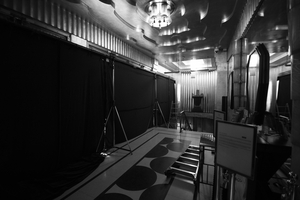
When the lockdown started in mid March, theatres all over the country were forced to shut down in a hurry. Nina Dunn, video designer with credits spread all over the West End and Europe, has been documenting the struggle of the industry through chilling photographs of empty theatres where silence dominates. A fundraiser has accompanied her online photo essays, which are now being turned into a book whose proceeds will go straight to charity. We had a chat to discuss her project, the effects of the closures, and dark theatres.
Tell us a bit about yourself - what do you do? How did you get interested in theatre?
I'm a video designer for theatre - I've been working in the industry for over ten years now. I moved from broadcast design, when I was working in motion graphics for people like the BBC. I've always been interested in theatre, since I was at school, but I didn't necessarily realise that I could apply my personal skills in that format. What people think about when they think about theatre is acting, but the people on stage are just the tip of the triangle.
There are so many people who work in theatre and bring a variety of different tools to a production. It was all about finding my place in theatre. I started in opera in Europe and did more and then more musicals and plays closer to home. At the time of the shutdown, I had two shows running in the West End and I was about to have a third that would have run simultaneously, which felt like a huge career high for me. I'd finally got to the place where I'd aimed to get to ever since I started, really. What I love about theatre is that it's a hugely collaborative art form. We're all creative problem-solvers; we love a challenge. But we also love to be allowed the ability to fix it. At the moment, it feels like it's beyond our control.
Tell us about The Dark Theatres Project
We were all in a lot of shock once the theatres closed. I spent four or five weeks watching show after show slowly dying a death. Once it all settled and we got into the rhythm of being in lockdown, I really felt like I needed a creative outlet: I knew that it would have helped me recover. I started thinking about what the theatres were like at that moment. I approached ATG, whom I've worked with before and really respect as producers, and I asked if I could access some of their theatres in the West End just to photograph them, to see what they felt like without the people and without the lights that we're used to.
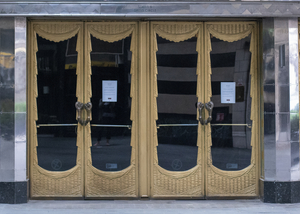
They very kindly agreed almost immediately; they were really on board with the project. I managed to do it legally - I didn't break lockdown. I photographed them a couple of days after we were officially all allowed to go back to places of work if we couldn't work from home. So, I returned to the theatres to do this, and I did the thing that I don't usually do at the theatre, which is taking photographs.
I remember when I first did a theatre show of any scale, I was in complete awe at the mechanisms both backstage and front of house of these buildings. I took thousands of photographs on my first few shows: everything was new, having come from broadcast, and it was all so impressive. These well-oiled machines, these practices that you had to follow, everything. It felt a little bit like that going back in. Initially, the idea just arose out of curiosity and as a response to the situation as an artist, but I quickly realised that I wanted to try to do something to help my fellow colleagues.
People were realising that no more packages were going to be released, the rules for freelancers weren't going to be changed to include people who'd fallen through the gaps. I have a huge number of colleagues who were very disheartened and upset and in a difficult position because of the lack of financial support. I thought I could try to raise some money for charity and see what happens.
I planned to release the photos as an online photo essay, accompanied by interviews just to raise awareness for the plight of theatres. Something between nostalgia and sorrow, in a way. But, actually, it's been an interesting process, I've found that each person I've talked to has found it really good to be reconnected with someone from the industry. We're all very close, we have a lot in common.
Each story shows a different side of theatre practice and each person gave a different description of that moment when the news was delivered that theatres had to close. I found this really fascinating in terms of people's individual response. I thought this photo essay would be a good way to memorialise this process in history.
There's also going to be a book published, which is going into print this month. Hopefully that will be a lasting reminder of this unique period in time. The theatres haven't suffered blanket closures in my lifetime - the last time they closed was during the Second World War, and before then it was during the 1918 pandemic. A blanket closure is is a really drastic but necessary move. I think at the moment there needs to be a certain level of activism to ensure the Government continue to take note.
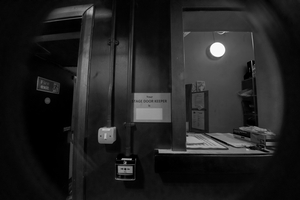
Each story that I release and each photo that I share helps to keep the discussion going online in its own tiny way. I'm glad the Government has started to listen to those at the top of our industry. Their responses before the rescue package was announced just wasn't matching what was being asked of them. They were being asked for a financial package because it isn't safe to open. But their response was "We're trying to get you to open, but it isn't safe yet".
Meanwhile, institutions up and down the country were going bust. What's kept the British public inside their houses fairly content is the constant supply of arts and culture through television, devices, and radio. At the moment, none of those arts practitioners can work. In my opinion, if you're closing down a sector, the need to provide financial support should be immediately self-evident.
What's been really nice is that people have approached me to illustrate their messages as well - I've got such a variety of images! I've got very personal images that show the absence of human beings with little doodles on a script, or mic packs being left on a table ready to go for the show. There's also the epic beauty of these deserted buildings either in light or in dark: there were some auditorium lights in some theatres, like the Savoy just glistened, waiting for its audience to return, but others like the Duke of York's was just epic in its complete darkness.
What did it feel like to stand in such massive places that are so used to being swarmed with people?
The silence was deafening. You always have a hum of a lighting rig, or the hubbub of happy people waiting for the show, or applause and laughter. I know all of the theatres to an extent, so in my mind I was very aware of the contrast between where I was standing at that moment and what it had been like previously. As I was walking, it was strange - I was almost filling in the gaps of where the other people would be even if they weren't there. Theatres are built for people. There's a contrast between the performer and the audience that's completely unique in a sense.
I've been in so many techs where we were sat there and said "All they need is an audience, we need to get them to previews". The performance doesn't fly until it's got its response from the audience. Both for things like comedy, but also for plays and musicals and performances of all types. An online stream can't deliver that as of yet. I was standing in this auditorium, up in the Circle, with just my camera light, which wouldn't even reach far - they're big places, even the smallest West End theatre!
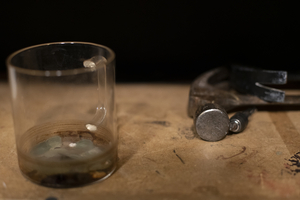
The hard closure of the iron at the proscenium makes you feel shut off from something. It felt wrong, even if I feel very at home at the theatre. There was such a guilt about having that space all to myself. They're supposed to be shared spaces.
You might be one of the very few people to ever experience that!
As far as I know, I am one of very few. I was really surprised that lots of other photographers hadn't already asked and I wasn't being batted away because people had been asking and asking. I suppose it's because a photographer would rightly expect to be paid for their time, whereas I was doing it as an artistic gesture and to raise money for other people. I'm doing OK financially - I've been very lucky that some of the contracts that I was due to run over the past three months have honoured their payments regardless of their shows not happening, and I'm constantly inventing schemes to keep myself going. So, I was hugely privileged to be able to do that.
Once I got the OK, I was desperate to get in there straightaway in case anyone cleared something away that would have spoken to me. I also put out a call for submissions, because some people were saying that it would have been nice to see more of the regions as well. I had a few really lovely images come back, so although the book will feature iconic London theatres, it will now also include some additional contribution from other regions. This is not a London-centric event. The theatres of arguably far greater community value are outside of London, I would say.
It was frustrating watching Oliver Dowden congratulating himself on facilitating the opening of the National Gallery. This was an undeniably important and welcome, but there are 39 theatres in the West End surrounding the National Gallery. It's going to look like a mouth full of missing teeth if they don't reopen. He's going to destroy the heart of the West End. So many people go to the West End primarily in order to go to the theatre - they visit that restaurant because it's next to that theatre.
There's a whole ecosystem of businesses that flies off the theatre trade. I think that all of this delay would have been be forgivable if the Government had been able to communicate a timeframe in which we were going to hear about it or some reassurance that they were going to put together a package. All we've been hearing is a silence when it comes to the theatre. A resounding, painful silence that started to feel like wilful neglect.
You've also spoken to theatre professionals, who did you interview? Was there a common thread that emerged from your conversations?
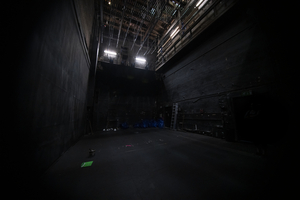
the Ambassador's Theatre
I've done ten interviews, I believe. I interviewed a whole range of people, from production managers to heads of sound to cast members - Natalie McQueen's given me an interview - the associate director of Blithe Spirit, a producer at the Ambassador Theatre Group, I interviewed Howard Harrison, the lighting designer, Nicholas Eagen, the company manager of The Seagull. What's nice is that they all have a different perspective on the story - I'm hoping that will provide quite a well-rounded picture. In fact, I think it might be worth my while to interview an audience member as well to make it a truly well-rounded piece.
I remember what I felt like: I was about to open City of Angels in the West End. We were going to lock the show on the Thursday of the week we closed and were trying to get people in on the Monday to do a hurried press night. We didn't make it and it's such a shame. I love that show - it's now one of my favourites. We were ready and we were really psyched to share it with the world. Of course, we'd had audiences in, but no press yet.
In the variety of theatres I chose, one show ended up closing behind closed doors so they didn't realise they weren't coming back; one show was towards the end of their run, so they managed to close and do the get-out, so it was a completely empty theatre ready for the new set to come in whenever that will be. Then the Duke of York with Blithe Spirit, they had a completely normal show day ready, they'd had their press night and were ready to carry on with their run; and then the Playhouse with The Seagull, which was in the same condition as City of Angels, it never had its press night.
We keep saying that we're resilient, we're creative, we'll find a way, and that out of all the industries we are those kind of people, but it's a shame that we were pushed so far into a corner with seemingly no light at the end of the tunnel for so long. They could have offered us something, a sort of light over the past 100 days, but they didn't. Nevertheless, there's a commonality of hope among all the interviews. What really strikes me is that they're talking about how much they're missing their theatre family. We are such a close-knit community.
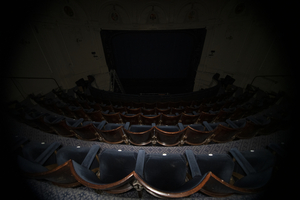
the Ambassador's Theatre
We have to be, because we're relying on each other in potentially life-threatening, dangerous scenarios on stage. We have to have trust in each other. What's more, we regularly work 15-hour days for weeks on end with each other and are creating stories together; storytelling is emotionally involving. All that makes quite a tight bond. We are a mirror for society, like any other art form. We're a sense of escapism, we are the reflection of a community coming together. On stage and off stage.
Do you have a favourite photo that you took?
It's really hard to choose. I've been releasing them as a series and very much responding to current affairs as I release them. Because I was trying to put them out very quickly, there was very little time to edit them, since I wanted the first images to hit and the project to launch on the three-month anniversary of the closures. The more I look through the images, the more meaning they take on. There's one image that everyone seems to really respond to: this box of treats that was left backstage and has this sticker on top which says "If you indulge please invest". Everyone has gone for that image, it really speaks.
It's also photographs of things like tasks that were left undone - the way that the theatres have been closed up and secured that is interesting. I called it The Dark Theatres Project because, obviously, "dark" means that there's no show on inside, but also this is like an enforced darkness. Let's not be romantic about it: there were no ghost lights. This is such a long darkness that it's not even feasible to have a ghost light on, it's not safe. It's a dark time.
Some of the images that express that darkness are amazing. But also, when you go up to the doors of some of these theatres, what you don't realise as you look for the darkness of the foyer is that they all have blacks on the back of the doors so that people can't look in. There were so many things left behind not knowing that they'd not be touched again for months. Then there's the majesty of these empty spaces.
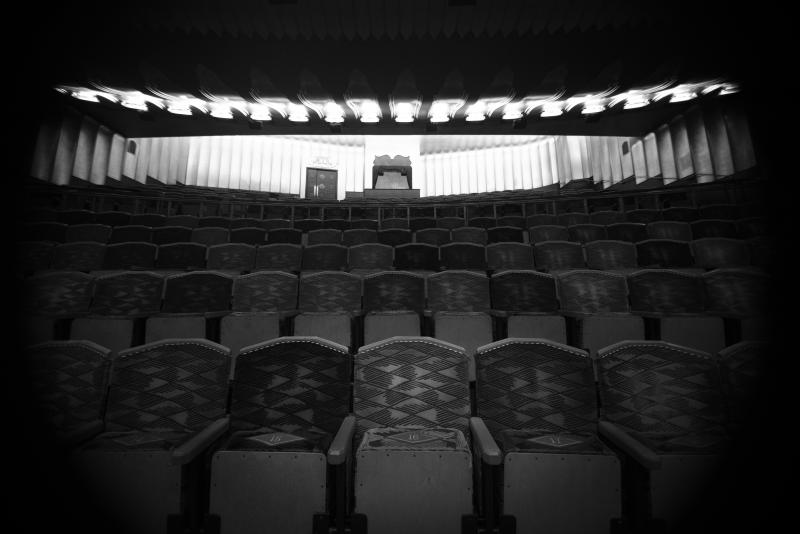
What would you like to achieve with the project? What's the ultimate goal?
I obviously hope that I raise enough money for the charities. Even if people don't want to buy the printed book, I'd love it if they could donate. It seems like a drop in the ocean, but there are lots of fundraisers going about and all of it helps. What I'm really keen on doing is spreading the word outside of the theatre bubble so that people outside, in wider society, realise what's at stake. It's a bit like Brexit: after Brexit started to happen, only then did people realise what it meant.
I don't want it to happen to theatres, I don't want people to realise what could be taken away only when it's too late. I don't want people to be robbed of their theatres. People also don't realise that we'd also be robbed of television, because theatre often is where the actors start out. The same is true of of music as well. People get breaks in grassroots venues, regional theatres, fringe festivals. They don't get straight to television or film. Also, the artists will leave. We will all leave and go to a place where we're valued.
I started working in European theatre; I will go back if I have no other choice. So, I think my hope for this book is that it becomes a legacy of this time, and that if people read the introduction from a place in the future, that they're reading it from a future that contains open, vibrant, and appreciated performing arts. And, of course, if they buy the book in that future, the money will still continue go to charity!
You can find out more about The Dark Theatre Project, support the cause, and pre-order the book here
All photo credits to Nina Dunn
Comments
Videos

